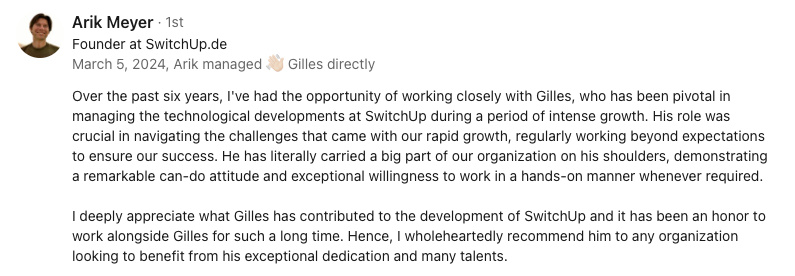Abstract:
The article highlights the critical role of supply chains in the adoption and affordability of electric vehicles (EVs), underscoring how efficient logistics and technological innovations are transforming the industry towards greener transportation. Supply chains are pivotal in reducing costs and improving accessibility by ensuring the timely and ethical sourcing of essential materials like lithium and cobalt. Innovations such as AI for demand forecasting and blockchain for transparency are enhancing supply chain efficiency and sustainability. Personal experiences, such as those in Berlin and Beijing, illustrate how strategic partnerships and local supply chain setups can stabilize production amidst geopolitical challenges. European companies, particularly startups like Northvolt and Skeleton Technologies, are leading with pioneering approaches in recycling and energy storage, setting new standards in the EV sector. Challenges like supply chain disruptions offer opportunities for startups to innovate through diversification and localization. The article concludes by emphasizing how these supply chain advancements not only make EVs more accessible but also encourage sustainable practices, potentially influencing consumer choices and business strategies.
Electric vehicles (EVs) are increasingly popular as a means to reduce pollution. However, their widespread adoption hinges on an often overlooked factor: supply chains. These networks play a pivotal role in making EVs more affordable and accessible. This article explores how supply chains are subtly transforming the EV industry and advancing greener transportation.
The Role of Supply Chains in EV Adoption
With the growing demand for environmentally friendly solutions, EVs are gaining traction. A key element of their success lies in the efficiency of their supply chains. This section highlights how these networks contribute to making EVs more affordable and accessible.
Supply Chains as the Backbone of EVs
Supply chains are the unsung heroes of the EV industry. They provide essential materials and components, such as lithium and cobalt for batteries, which influence the cost and production speed of EVs. Efficient supply chains reduce costs and expedite delivery to customers. During my time in China and Europe, I observed the significant impact of global supply chains on local production. For instance, in Berlin, streamlined supply chains have helped lower the cost of EVs for everyone.
Improving supply chains is not just about logistics; it also has economic implications. By enhancing supply chain efficiency, manufacturers can cut costs and pass these savings on to consumers. Here are some examples:
- Smart logistics systems reduce transportation costs.
- AI-driven demand forecasting optimizes inventory.
- Local partnerships decrease reliance on imports.
These advancements lower the barriers to EV adoption, accelerating their uptake.
Accelerating EV Adoption Through Innovation
In the dynamic EV industry, innovations in supply chain management are crucial for increasing EV adoption. Technologies like AI and blockchain are revolutionizing logistics, making them more efficient and transparent. AI helps forecast demand, keeping supply chains agile. In Berlin, my team successfully leveraged AI to enhance logistics, strengthening our supply chain. These technological advances bolster supply chains and extend EV reach.
Addressing geopolitical risks through strategic partnerships and localized supply chains enhances production stability. Companies are forming alliances and establishing local networks to mitigate international challenges. In Beijing, strategic partnerships played a vital role in maintaining resource stability during challenging times. These experiences underscore the importance of robust supply chains for widespread EV adoption.
Technological Innovations Transforming Supply Chains in the EV Industry
The EV industry is rapidly evolving, thanks to technology that enhances supply chains. These advancements not only improve efficiency but also ensure ethical practices throughout the process.
AI and Machine Learning Applications
AI and machine learning are revolutionizing supply chains, particularly in logistics and inventory management. Predictive analytics aid demand forecasting, aligning production with market needs. Studies indicate that AI can reduce forecasting errors by up to 50%, a significant advantage in an unpredictable market.
These technologies also enhance inventory management precision, automating processes to lower holding costs and ensure timely production. My experience in Berlin demonstrated that AI can lead to cost reductions and improved operations. Now, let's explore how blockchain contributes to transparency.
Blockchain for Transparency
Blockchain technology is transforming material sourcing by ensuring transparency and traceability. It provides a secure record of transactions, verifying that materials are ethically sourced. Companies like BMW and Ford utilize blockchain to certify ethical sourcing, offering consumers peace of mind.
Blockchain also minimizes fraud and errors, fostering trust among partners. It holds all parties accountable, reducing disputes and enhancing efficiency. Through blockchain, automotive companies can verify the ethical sourcing of raw materials. Next, we'll examine the importance of responsible material sourcing.
Through AI and blockchain, the EV industry is not only optimizing supply chains but also ensuring they are sustainable and transparent. These advancements lay a solid foundation for the future of EVs, meeting both consumer and environmental expectations.
Sustainable Sourcing and Material Management
As EVs gain popularity, responsibly sourcing key materials like lithium and cobalt becomes crucial. This section examines ethical sourcing strategies and recycling methods that support a sustainable supply chain.
Ethical Sourcing of Lithium and Cobalt
Traceability systems and local community engagement are essential for ethical mineral sourcing. Blockchain provides secure transaction records, confirming responsible sourcing. Collaborating with local communities ensures fair compensation and sustainable development, benefiting both companies and communities.
Sustainable mining and recycling programs are vital for a circular economy. Some companies have adopted recycling to reuse lithium and cobalt, reducing environmental impact. In Europe, advanced recycling processes effectively recover valuable metals, minimizing waste and enhancing self-sufficiency.
Innovations in Recycling
Europe is at the forefront of recycling methods like hydrometallurgy, which are more environmentally friendly. Techniques such as mechanical separation and direct recycling play a significant role in waste reduction. Belgium's Umicore exemplifies this commitment.
Closed-loop recycling systems contribute by reusing materials in new battery production. Companies like Northvolt in Sweden are pioneering this approach, minimizing waste and ensuring the sustainable growth of the EV industry.
European Excellence in EV Supply Chain Innovations
Europe is leading the EV industry, setting new benchmarks for efficiency and sustainability. Let's explore some key players and their strategies.
Pioneering Startups in Supply Chain Innovations
European startups are making significant strides in EV supply chain technology. Northvolt in Sweden utilizes renewable energy for battery manufacturing, setting standards with its closed-loop recycling process.
Skeleton Technologies in Estonia is revolutionizing energy storage with its ultracapacitor technology. These ultracapacitors charge and discharge rapidly, enhancing EV performance.
Lessons from Transformative Supply Chains
European supply chains offer valuable lessons. Strategic partnerships and a focus on sustainability have been crucial. Collaborations like Northvolt and Volkswagen for battery manufacturing demonstrate how teamwork fosters innovation.
Digital technologies like IoT and blockchain are indispensable. They ensure transparency and efficiency. Blockchain provides an immutable record of transactions, essential for ethical sourcing. European companies are setting a transparency standard that could become the global norm.
Challenges and Opportunities for Startups in the EV Supply Chain
Navigating the EV supply chain is challenging, especially for startups. However, there are numerous opportunities for innovation and collaboration, particularly in Europe.
Overcoming Supply Chain Disruptions
Supply chain disruptions pose a significant challenge, often exacerbated by geopolitical issues. Startups can mitigate these by diversifying supply sources and localizing production.
- Diversification: Secure multiple suppliers.
- Localization: Establish hubs closer to key markets.
Technology plays a crucial role in strengthening supply chains. AI for predictive analytics can anticipate disruptions, allowing startups to adapt. In Berlin, AI technology helped us address supply chain challenges.
Opportunities for Innovation
Despite challenges, startups have ample opportunities to innovate within the EV supply chain.
- Battery Innovation: Focus on energy density and recycling.
- Recycling Initiatives: Develop improved battery recovery technology.
Collaborations amplify opportunities. Partnering with OEMs and aligning with EU policies provide competitive advantages. Strategic partnerships open up resources and market opportunities.
Actionable Strategies for Startups
Startups in the EV sector can enhance efficiency and sustainability by leveraging technology and emphasizing sustainable practices.
Leveraging Technology for Efficiency
IoT and AI can transform operations, cutting costs. IoT provides real-time data, ensuring accurate inventory and timely deliveries. IoT sensors predict equipment failures, minimizing downtime. AI refines demand forecasting, aligning production with market needs.
Blockchain technology is crucial for transparency. It offers a secure transaction record, ensuring ethical sourcing. This builds trust and meets regulatory standards. Adopting blockchain enhances brand reputation and consumer confidence.
Building Resilient and Sustainable Supply Chains
Local sourcing and diversifying supply sources enhance resilience. Engaging multiple suppliers ensures continuity and aligns with sustainability goals.
Investing in technology and innovation is vital. AI and blockchain make supply chains more adaptable and efficient. Combining these strategies creates a robust foundation for a sustainable, adaptable supply chain.
Electric vehicles represent more than just a step toward sustainability; they exemplify how innovation in supply chains can make a tangible difference. Efficient supply chains reduce costs and increase EV accessibility, powered by AI and blockchain. Ethical sourcing and recycling are paving the way for a sustainable future. As the EV industry continues to grow, consider how these changes might influence your next vehicle choice or business strategy.














